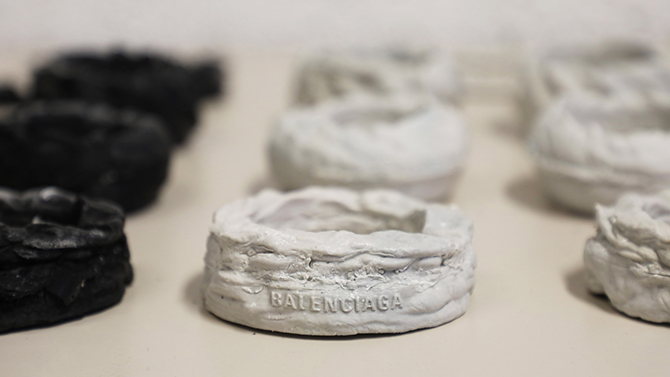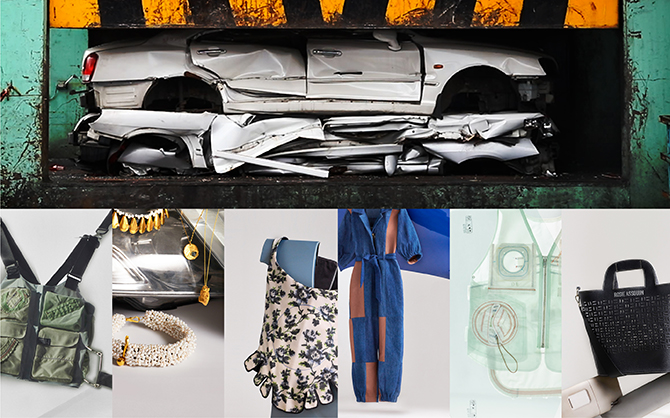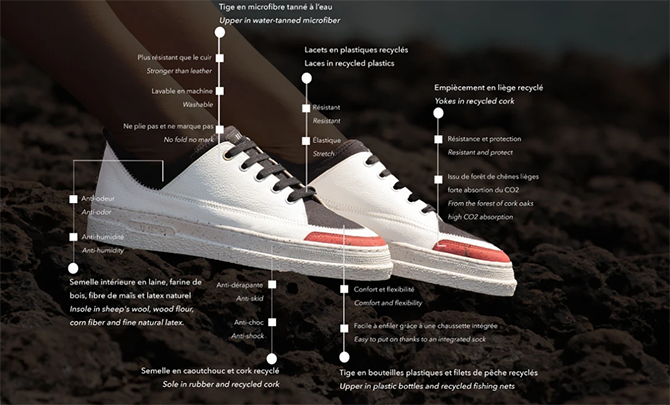Magazine
Design incorporates objects, people,
ideas based on the small pleasures of everyday life.
Meet your wonderful design world with the DDP Design Fair.



Plastic Waste Turned into Materials for Fashion
Reducing Plastic Use with Designers’ Innovative Approaches
Since the outbreak of the COVID-19 pandemic, the global apparel industry has been actively participating to drive recycled plastic innovation.
Most consumers may not think of plastic when they think of fashion. In fact, 63 percent of apparel products we buy and wear are made of virgin plastic, and it is said that the global apparel industry uses a whopping 65 million tons of virgin plastic per year. In addition, antioxidants, dyes and fire retardants in fabrics are also used as additives that break down plastic into smaller fragments. These various derivatives end up in the rivers, oceans and food chains around us in the form of chemicals and microplastics and enter human bodies.
In order to tackle the problem of plastic pollution caused by the fashion industry, global apparel brands including Stella McCartney, Everlane, Adidas, Patagonia and H&M are recycling clear PET drinking water bottles and fishing rods that are thrown away and collected from the ocean and using them to produce new products.
For example, Everlane's ReNew Collection has seen such a positive response from customers by launching eco-friendly swimwear and socks made of recycled plastic in cooperation with innovative textile manufacturers that process plastic waste into recycled synthetic yarns that have been sterilized, processed and spun.
Hyundai Motors in Korea has been collaborating with famous fashion designers since 2020 and once worked on an upcycling project to transform used airbags into clothes. Meanwhile, Israeli plastic upcycling startup Remeant developed a technology that converts disposable plastic products that are difficult to recycle such as bubble wrap into lightweight and waterproof synthetic leather.
There are companies that take a step further. More and more companies are using sustainable fabrics that are blended with recycled plastic and natural plant extracts. For instance, Juch, the French eco-friendly sneaker brand, launched vegan leather shoes that are manufactured by combining shoelaces recycled from ocean plastic waste, sustainably sourced cork, natural rubber soles and inner insoles made of natural latex, wool, wood and cornstarch to meet the needs of consumers and stakeholders who want eco-friendly and sustainable products.
However, recycling plastic waste and consuming upcycled apparel made from plastic cannot solve the fundamental problem of plastic waste pollution on our planet.
According to a consumer survey, consumers think that about half of the clothes sold by fast fashion brands are made of plastic. In fact, 90 percent of clothes sold in the industry use virgin or recycled plastic. In addition, about 500,000 microfibers are released into the water system and make their way into the oceans each time we wash our clothes in a washing machine, an average 6 kg wash.
There are still many consumers who purchase cheap and convenient fast fashion clothing. Amid this continuing trend, fashion and plastic are inextricably linked. Given that reality, the innovative efforts of designers should continue to come up with solutions that can reduce the use of plastic, whether made from virgin or recycled plastic.
‘From Cars to Couture’ Hyundai Re:Style 2020 x Selfridges Department Store’s Fashion Line.
Balenciaga x Designer Shahar Livne. Fossil-like Jewelry Line Created Through the Collaboration. © Shahar Livne Design.
Juch Paris’ Eco-friendly, Sustainable and Comfortable Sneakers. © 2021, JUCH.
| 이전글 | When La Bouche Rouge Meets Clean Beauty |
|---|---|
| 다음글 | Plant-based Crayons Made from Vegetables and Fruits |







